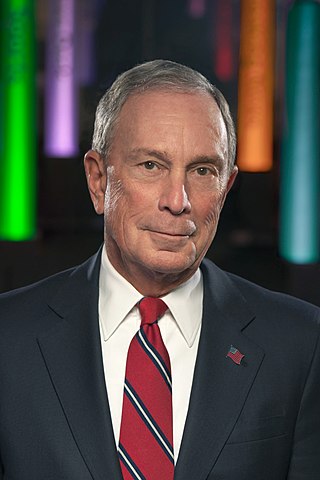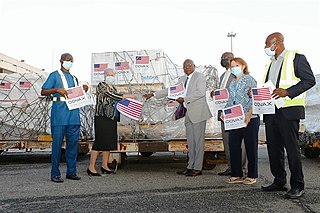Related Research Articles

The World Health Organization (WHO) is a specialized agency of the United Nations responsible for international public health. Headquartered in Geneva, Switzerland, it has six regional offices and 150 field offices worldwide.

The United Nations Foundation is a charitable organization headquartered in Washington, DC, that supports the United Nations and its activities. It was established in 1998 with a $1 billion gift to the United Nations by philanthropist Ted Turner, who believed the UN was crucial for addressing the world's problems. Originally primarily a grantmaker, the UN Foundation has evolved into a strategic partner to the UN, mobilizing support to advance the Sustainable Development Goals (SDGs), and help the UN address issues such as climate change, global health, gender equality, human rights, data and technology, peace, and humanitarian responses. The UN Foundation's main work occurs through building public-private partnerships, communities, initiatives, campaigns, and alliances to broaden support for the UN and solve global problems. The UN Foundation has helped build awareness and advocate for action on, among others, antimicrobial resistance, regional action on climate change, local implementation of the SDGs, as well as global campaigns such as Nothing But Nets against malaria, the Measles & Rubella Initiative, the Clean Cooking Alliance, Girl Up, Shot@Life, and the Digital Impact Alliance, among others. In March 2020, the UN Foundation was also a key founder of the COVID-19 Solidarity Response Fund on behalf of the World Health Organization (WHO), helping to raise over $200 million USD within the first six weeks to support the global response to the COVID-19 pandemic.

Michael Rubens Bloomberg is an American businessman, politician, philanthropist, and author. He is the majority owner, co-founder and CEO of Bloomberg L.P. He was Mayor of New York City from 2002 to 2013, and was a candidate for the 2020 Democratic nomination for President of the United States. He has served as chair of the Defense Innovation Board, an independent advisory board that provides recommendations on artificial intelligence, software, data and digital modernization to the United States Department of Defense, since June 2022.

The Bill & Melinda Gates Foundation (BMGF), a merging of the William H. Gates Foundation and the Gates Learning Foundation, is an American private foundation founded by Bill Gates and Melinda French Gates. Based in Seattle, Washington, it was launched in 2000 and is reported as of 2020 to be the second largest charitable foundation in the world, holding $49.8 billion in assets. On his 43rd birthday, Bill Gates gave the foundation $1 billion. The primary stated goals of the foundation are to enhance healthcare and reduce extreme poverty across the world, and to expand educational opportunities and access to information technology in the U.S. Key individuals of the foundation include Bill Gates, Melinda French Gates, Warren Buffett, chief executive officer Mark Suzman, and Michael Larson.
The Robert Wood Johnson Foundation (RWJF) is an American philanthropic organization. It is the largest one focused solely on health. Based in Princeton, New Jersey, the foundation focuses on access to health care, public health, health equity, leadership and training, and changing systems to address barriers to health. RWJF has been credited with helping to develop the 911 emergency system, reducing tobacco use among Americans, lowering rates of unwanted teenage pregnancies, and improving perceptions of hospice care.

World Health Day is a global health awareness day celebrated every year on 7 April, under the sponsorship of the World Health Organization (WHO), as well as other related organizations.
The Poynter Institute for Media Studies is a non-profit journalism school and research organization in St. Petersburg, Florida, United States. The school is the owner of the Tampa Bay Times newspaper and the International Fact-Checking Network. It also operates PolitiFact.

Marc Russell Benioff is an American internet entrepreneur and philanthropist. Benioff is best known as the co-founder, chairman and CEO of the software company Salesforce, as well as being the owner of the magazine Time since 2018.

Direct Relief is a nonprofit humanitarian organization whose mission is to improve the lives of people in poverty or emergency situations by providing the appropriate medical resources. The charity provides emergency medical assistance and disaster relief in the United States and internationally. The organization is headed by an independent board of directors and its president and CEO, Thomas Tighe.
The Johns Hopkins Center for Health Security is an independent, nonprofit organization of the Johns Hopkins Bloomberg School of Public Health. The center works to protect people's health from epidemics and pandemics and ensures that communities are resilient to major challenges. The center is also concerned with biological weapons and the biosecurity implications of emerging biotechnology.

The Tea Party Patriots is an American conservative political organization founded in 2009 as part of the Tea Party movement. It is known for organizing citizen opposition to the Affordable Care Act during the presidency of Barack Obama, and more recently for supporting President Donald Trump.

Bloomberg Philanthropies is a philanthropic organization that encompasses all of the charitable giving of founder Michael R. Bloomberg. Headquartered in New York City, Bloomberg Philanthropies focuses its resources on five areas: the environment, public health, the arts, government innovation and education. According to the Foundation Center, Bloomberg Philanthropies was the 10th largest foundation in the United States in 2015, the last year for which data was available. Bloomberg has pledged to donate the majority of his wealth, currently estimated at more than $54 billion. Patti Harris is the CEO of Bloomberg Philanthropies.
GivingTuesday, often stylized as #GivingTuesday for the purposes of hashtag activism, is the Tuesday after Thanksgiving in the United States. It is touted as a "global generosity movement unleashing the power of people and organizations to transform their communities and the world". The organization of the same name is an independent 501(c)(3) nonprofit that supports the global movement.
Arnold VenturesLLC is focused on evidence-based giving in a wide range of categories including: criminal justice, education, health care, and public finance. The organization was founded by billionaires John D. Arnold and Laura Arnold in 2010.
Open Philanthropy is a research and grantmaking foundation that makes grants based on the doctrine of effective altruism. It was founded as a partnership between GiveWell and Good Ventures. Its current co-chief executive officers are Holden Karnofsky and Alexander Berger, and its main funders are Cari Tuna and Dustin Moskovitz. Dustin says that their wealth, worth $11 billion, is "pooled up around us right now, but it belongs to the world. We intend not to have much when we die."

Philanthropies, formerly LDS Philanthropies, is a department of the Church of Jesus Christ of Latter-day Saints and is responsible for facilitating donations to humanitarian and educational initiatives. The department works under the direction of the church's Presiding Bishop. The most widely known educational projects are the operation of church-owned schools, such as Brigham Young University (BYU). Humanitarian funds are given to Latter-day Saint Charities which sponsors and organizes relief efforts. In 2019, the church reported over 3,000 community-based projects with an excess of 2,000 partners, in locations around the world. A 2020 statistic reported a total of $2.3 billion that had been donated over Philanthropies' existence.

The World Health Organization (WHO) is a leading organisation involved in the global coordination for mitigating the COVID-19 pandemic within the broader United Nations response to the pandemic.

The COVID-19 pandemic has greatly impacted the international and domestic economies. Thus, many organizations, private individuals, religious institutions and governments have created different charitable drives, concerts and other events to lessen the economic impact felt.

The United Nations response to the COVID-19 pandemic has been led by its Secretary-General and can be divided into formal resolutions at the General Assembly and at the Security Council (UNSC), and operations via its specialized agencies and chiefly the World Health Organization in the initial stages, but involving more humanitarian-oriented agencies as the humanitarian impact became clearer, and then economic organizations, like the United Nations Conference on Trade and Development, the International Labour Organization, and the World Bank, as the socioeconomic implications worsened.

COVID-19 Vaccines Global Access, abbreviated as COVAX, is a worldwide initiative aimed at equitable access to COVID-19 vaccines directed by the GAVI vaccine alliance, the Coalition for Epidemic Preparedness Innovations (CEPI), and the World Health Organization (WHO), alongside key delivery partner UNICEF. It is one of the four pillars of the Access to COVID-19 Tools Accelerator, an initiative begun in April 2020 by the WHO, the European Commission, and the government of France as a response to the COVID-19 pandemic. COVAX coordinates international resources to enable low-to-middle-income countries equitable access to COVID-19 tests, therapies, and vaccines. UNICEF is the key delivery partner, leveraging its experience as the largest single vaccine buyer in the world and working on the procurement of COVID-19 vaccine doses, as well as logistics, country readiness and in-country delivery.
References
- 1 2 3 "Coronavirus update: new WHO fund, Guterres calls for 'prudence, not panic'". UN News. UNO. 13 March 2020. Retrieved 16 March 2020.
- 1 2 "COVID-19 Solidarity Response Fund for the World Health Organization: Impact Report 1 July – 31 December 2021" (PDF). COVID-19 Solidarity Response Fund. Archived (PDF) from the original on 18 August 2022. Retrieved 18 August 2022.
- ↑ "WHO, UN Foundation and partners launch first-of-its-kind COVID-19 Solidarity Response Fund". www.who.int. World Health Organization. Retrieved 16 March 2020.
- 1 2 Turk, Robyn (16 March 2020). "H&M Foundation donates to COVID-19 Solidarity Response Fund". fashionunited.uk. Retrieved 16 March 2020.
- 1 2 "Together we can raise $7.5 million to help stop COVID-19". Google.org. Archived from the original on 16 March 2020. Retrieved 16 March 2020.
- 1 2 "Facebook Commits $20 Million in Matching Funds for COVID-19 Response". Philanthropy News Digest (PND). Retrieved 16 March 2020.
- ↑ "WHO and UNICEF to partner on pandemic response through COVID-19 Solidarity Response Fund". www.who.int. Retrieved 19 May 2020.
- ↑ "COVID-19 contributions tracker". www.who.int. Retrieved 19 May 2020.
- ↑ "Supporters of the Fund". COVID-19 Solidarity Response Fund. 2021. Archived from the original on 18 August 2022. Retrieved 18 August 2022.
- ↑ "Bloomberg Philanthropies Partners with Global Citizen to Support the One World: Together At Home initiative, Commits $8 Million to World Health Organization (WHO) Solidarity Response Fund". Bloomberg Philanthropies . 18 April 2020. Archived from the original on 15 May 2022. Retrieved 18 August 2022.
- ↑ "Rihanna's Clara Lionel Foundation donates $5 million toward coronavirus relief". Los Angeles Times. 21 March 2020. Retrieved 18 August 2022.